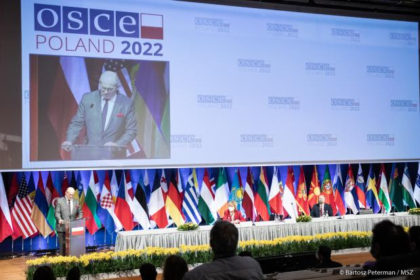OSCE leaders call for greater efforts to combat anti-Semitism across the OSCE region
WARSAW, 8 February 2022 – A two-day conference at the POLIN Museum of the History of Polish Jews under the auspices of Poland’s Chairmanship of the OSCE in 2022 gathered together OSCE leaders and several hundred online and in-person participants to discuss more effective ways of combating anti-Semitism, xenophobia, and discrimination. The event was preceded by a wreath-laying ceremony at the Monument to the Ghetto Heroes.
The OSCE Chairman-in-Office and Minister for Foreign Affairs of Poland, Zbigniew Rau pointed out that all forms of anti-Semitism should be met with a firm response. “Anti-Semitism will not disappear overnight. It requires time and forward-looking proposals. Poland is privileged to lead these efforts of the OSCE in 2022,” he said.
On behalf of the Polish President, a letter was read out by Secretary of State at the President’s Chancellery Wojciech Kolarski: “Combating anti–Semitism requires a comprehensive strategy and skilful use of various methods and measures: from education through prudent and reliable information policy to legal remedies. We cannot remain defenceless in the face of lies and hostility.”
In her address to conference participants, OSCE Secretary General Helga Schmid urged to keep up efforts to eradicate all forms of anti-Semitism: “Anti-Semitism remains a serious and persistent challenge in many of our societies. Jewish communities in the OSCE region are still targeted by terrorist attacks on synagogues, and are victims of violence and hate speech– all of this is despicable and intolerable. We all must remain alert to any form of anti-Semitism and stand strongly to counter it. Not only on an international remembrance day, but every day.“
“We need creative solutions in order to halt the spread of anti-Semitism, Holocaust denial, and the conspiracy theories that harm not only the Jewish communities directly targeted but also entire societies across the OSCE region,” said ODIHR Director Matteo Mecacci. “ODIHR’s assistance to OSCE countries in combating anti-Semitism takes many forms, from documenting hate crime, through strengthening the security of Jewish communities, to supporting schools and teachers in their vital role of building young people’s resilience to the prejudice and stereotypes that drive hatred.”
The conference gathered government representatives, as well as relevant stakeholders from international organizations, academia, civil society organizations, leaders of Jewish communities and local activists, and offered a platform for dialogue on challenges and good practices in addressing anti-Semitism. Participants discussed current risks and challenges of combating anti-Semitism in the OSCE area and addressing it online; fostering Jewish life revival and the role of local activists as well as addressing anti-Semitism and anti-Roma discrimination in and through education.
The conference concluded with practical recommendations on all these topics from, among others, the representatives of the United Nations, the Council of Europe as well as all three Personal Representatives of the Chairman-in-Office on Tolerance and Non-Discrimination: Rabbi Andrew Baker, Ambassador Mehmet Paçacı and Professor Regina Polak.
